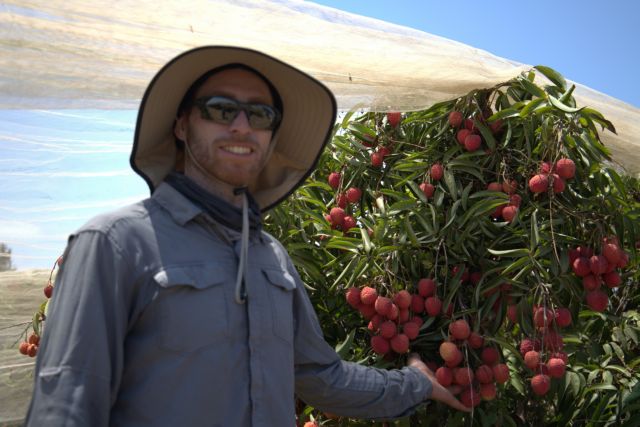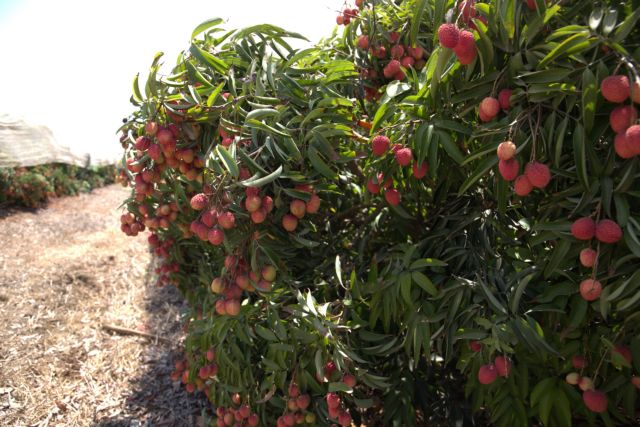 Society
Society

 |
| Uri Shpatz and lychee clusters grown by his team in Israel. VNA/VNS Photos Thanh Bình |
HÀ NỘI — Vietnamese lychee trees are thought to be particularly adapted to only the basaltic red soils of Việt Nam. No one could have imagined it would not only survive, but flower and produce an abundant crop in the Israeli desert.
By late June into early July, the Mediterranean winds began to sweep across the northern hills of Israel, bringing golden sunshine and a salty breeze from the sea. Meanwhile, the first clusters of ripe, crimson-red lychees appeared across a nearly 10-hectare field on the outskirts of HaBonim City.
On the modern farm of the Bananot Hahof Agricultural Cooperative, which has been cultivating the U Hồng lychee variety since 2016, the lychee season has reached its peak. The harvest is bustling with activity, a testament to nearly a decade of determined human efforts to tame nature.
Bananot Hahof lead agronomist Uri Shpatz explained that they were not the first to bring the Vietnamese lychee to this Middle Eastern nation.
According to Uri, this variety was first imported to Israel about 15–18 years ago by the Israeli lychee growers association, in collaboration with the Agricultural Research Organisation.
After planting, the lychee trees begin to yield from the fourth year, and reach maximum productivity after six to seven years. Uri said: “Typically, when introducing a new crop to a different region, it takes several years to adjust the cultivation process to match the local climate and soil conditions.”
Right from the start, the project faced many challenges, especially due to the arid soil, low rainfall and drastic temperature fluctuations — all contrary to the ideal growing conditions for lychee.
The lychee tree grows slowly, has a prolonged flowering cycle and is extremely sensitive to temperature, humidity and pruning methods, according to Uri.
The agricultural team at Bananot Hahof has been patient in refining their techniques step by step, using drip irrigation systems and microclimate control along with special flowering treatments. After three to four years, the first lychee clusters began to appear consistently.
Uri said: “The U Hồng variety gradually adapted and required less technical intervention compared to the Mauritius variety we previously grew.”
U Hồng lychee trees are highly regarded for their strong vitality, high yields, large fruit size and a superior flesh-to-seed ratio. The faith placed in this Vietnamese variety has now been handsomely rewarded.
 |
| U Hồng lychees have produced abundant fruit in Israel. |
Thanks to microclimate sensors and precision agriculture technologies, each section of the farm is now optimised for humidity, light and temperature.
The lychee trees don’t just survive — they thrive, flowering evenly and producing prolifically. Current yields stand at 25 tonnes per hectare, a stunning achievement for a plant originally associated with Việt Nam’s basalt-rich soils.
From late June to mid-July, the farm transforms into a vibrant scene, draped in the deep red of ripening lychees.
Teams of workers harvest and sort the fruit on-site.
Lychees are carefully packed the same day and transported in refrigerated trucks to Tel Aviv, Haifa, Jerusalem and even to European supermarkets.
Uri noted that the export ratio varied from year to year, depending on domestic demand and supply.
“If there’s a surplus of fruit in the domestic market, we will prioritise exports, so sometimes most of the yield is shipped abroad. But in years when local prices are higher than export prices, we keep more fruit for domestic consumption,” he said.
“European customers are enchanted by lychees due to their natural fragrance and uniquely sweet, refreshing flavour,” he added.
“But since lychees have a very short shelf life after harvesting, logistics must be extremely stringent — there’s no room for error.”
Major export markets include Western European countries such as Germany, France, the UK, the Netherlands and Italy.
In addition to lychee, Bananot Hahof is a leading name in banana, pineapple and grape cultivation.
The cooperative primarily partners with top Israeli suppliers like Netafim, Rivulis and Metzer. Most banana and pineapple varieties are sourced from Ginosar Agro, with some from Rahan Meristems.
Remarkably, Bananot Hahof’s grape yields reach 30 tonnes per hectare and are considered among the best-tasting grapes in the world.
Bananot Hahof stands as a model for the modern agricultural cooperative in Israel — a place where agricultural tradition merges with cutting-edge innovation.
They don’t just grow crops, but invest heavily in R&D to improve irrigation techniques, control microclimates with data and optimise every stage, from planting to distribution. VNS




